- ACP Launches Operations in India
- ACP Leaders on the Road: India
- Register Now for Internal Medicine 2013
- ACP Leaders on the Road: UAE
- ACP Global Perspectives
- Update Your Knowledge with MKSAP 16 Q & A
- International Meetings Update
- Future Worldwide Internal Medicine Meetings
- ACP Welcomes New International Fellows
- Highlights from ACP Internist and ACP Hospitalist
- College Corner
- Email Page to a Colleague
ACP Launches Operations in India
The American College of Physicians recently announced plans to initiate educational programs in India starting in 2013.
Phyllis A. Guze, MD, FACP, Chair of ACP’s Board of Regents, and Jim Ott, ACP’s Senior Vice President of International Programs, visited New Delhi in December 2012 to participate in ACP India’s launch. ACP India will organize guest lectures, training workshops and conferences with international speakers to promote exchange of knowledge and best practices.
“ACP is known for providing tools and educational resources for physicians to deliver high-value, cost-effective care to their patients,” said Dr. Guze. “In India, we will be no different.”
Mr. Ott told attendees at the launch event that “ACP’s goal is to establish a chapter in India directed by local internal medicine leaders, which will lead to regular scientific meetings, educational programs, leadership development, networking and participating in the governance of ACP.”
For more information about ACP India, click here.
ACP Leaders on the Road: India
Phyllis Guze, MD, FACP, Chair, ACP Board of Regents
In December, 2012, I was fortunate to participate in the launching of ACP India which took place in New Delhi. This event marked the introduction of ACP in India and the opening of its office in Mumbai. I was accompanied by Jim Ott, Senior Vice President, International Programs. The visit was arranged and coordinated by a consultant group (MCI) who was extraordinary in their knowledge of Indian medicine, medical institutions and health care politics.
Most of our activities occurred on December 4, 2012. We started the day with a press conference at the Oberoi Hotel where Jim Ott and I had the opportunity to meet with journalists from about 8 publishers. Some of the journalists were freelance writers and some worked for Express Healthcare, Indiatimes and Network18 Publishing. Jim and I provided some preliminary remarks about ACP's interest in sharing knowledge, and collaborating with local medical societies and hospitals. The journalists were interested in ACP's experience internationally, the extent of the programs, products and services we would offer to Indian physicians, and eligibility, to name a few topics. Lunch followed after the question and answer period which gave me an opportunity to informally continue to discuss other issues and provide me with the first of many wonderful meals.
We then had the opportunity to meet with representatives of the Maharashtra Medical Council and Indian Medical Association to discuss the possibility of developing collaborative online Continuing Medical Education programs for Indian physicians. This was a very productive meeting and I was appreciative that these physicians flew to Delhi to meet with us.

From left: Dr. Farah Deeba, Dr. Professor Asif I. Ahmed, Mr. Jim Ott, and Dr. Phyllis Guze.
The actual ACP India launch event was held in the evening at the Oberoi Hotel, one of the well-recognized hotels in New Delhi. MCI did an excellent job handling the preparations for the event. The invitee list included high level officials from the various medical societies, key physicians from major institutions, ACP Members and Fellows, hospital administrators, and a handful of others.
About 30 people attended this event and after and introduction from Jim Ott, I presented a talk on the ACP. The question and answer time focused again on eligibility, services and products with a few of our members specifically asking about our fellowship exchange programs.
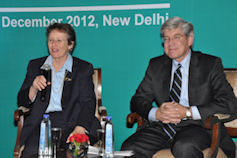
From left: Dr. Phyllis Guze and Jim Ott.
We then adjourned and offered a buffet dinner while Jim and I informally interacted with our attendees. I felt a sense of enthusiastic support in having ACP develop a presence in India with emphasis on our strengths -- education and providing internists with the knowledge to provide the best of medical care.
The following day we toured a few hospitals in Delhi getting a sense of the changes going on in the health care in that city and India. The largest growth of hospitals is in the private sector and internists are being hired by these institutions to provide consultative care to their specialists and subspecialists.
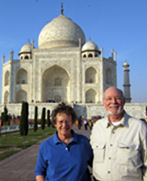
Dr. Phyllis Guze and Dr. Fred Eiserling at the Taj Mahal.
On a personal note, Fred and I had an opportunity at the end of the week to drive to Agra and go to the Taj Mahal. An extraordinary example of the finest Islamic architecture and truly worth seeing in person. All in all, the trip to India was very successful and I am optimistic that we will further our relationship with Indian internists and the Indian medical establishment.
I look forward to seeing you in San Francisco in April for Internal Medicine 2013.
Register Now for Internal Medicine 2013
There is still time to join ACP and thousands of your colleagues in San Francisco, California, and transform the way you practice medicine. Internal Medicine 2013 is the only meeting of its kind-combining clinical skills workshops with over 200 scientific sessions to update your knowledge in all facets of internal medicine and the subspecialties.
Refresh your internal medicine knowledge, sharpen your practice management skills, and network with the best and brightest physicians from around the globe. All of this plus a variety of special events including a reception for International attendees make this a meeting not to be missed.
ACP Leaders on the Road: United Arab Emirates
David L. Bronson, MD, FACP, President, American College of Physicians
I had the pleasure of serving as ACP's Ambassador to the AIMS 2013 meeting in Abu Dhabi, UAE, on February 13-15, 2013. Approximately 370 attendees from 14 countries attended the event. Adeel A. Butt, MD, MS, FACP, Chair of Medicine at the Sheikh Khalifa Medical City, Abu Dhabi, ably served as Chair of the Organizing Committee. SKMC is a major teaching hospital.
The meeting was officially endorsed by the American College of Physicians, the Abu Dhabi Health Services Company (SEHA) and the Sheikh Khalifa Medical City. Spread over three days, the conference was intended for all health care professionals, including doctors of Internal Medicine, subspecialists, General Practitioners, medical residents and fellows as well as allied health professionals.
CME was provided by the Health Authority of Abu Dhabi and the Accreditation Council of Continuing Medical Education. Theme sessions covered various specialties of medicine including: Cardiovascular Diseases, Diabetes, Endocrinology, Infectious Disease, Nephrology, Gastroenterology and others.
The Opening Day included remarks by His Highness Sheikh Nahayan Mabarak Al Nahayan, the UAE Minister of Higher Education and Scientific Research. I was honored to participate as faculty and presented a lecture entitled: "Challenges to Internal Medicine in the US and Internationally."
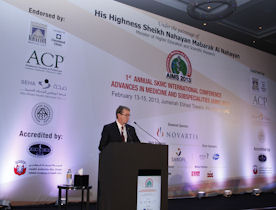
Dr. Bronson presenting his lecture.
I was impressed with the quality of the physicians and medical residents in attendence and their commitment to the ideals of our profession. Their interest in the college as a vehicle for professional growth was quite evident.
There was a great deal of interest in ACP membership and our products and resources, particularly the College's Medical Knowledge Self-Assessment Program (MKSAP 16).
Immediately following the conference, I also had the pleasure to meet with a number of attendees who expressed interest in forming a new ACP chapter. The enthusiasm for the chapter is a reflection of the rapid growth in membership in the Middle East. There was a great deal of enthusiasm for the chapter and, as a result, the College will be working with local internal medicine leaders to take the initial steps toward creating ACP's second chapter in the region, joining ACP's Saudi Arabia chapter.
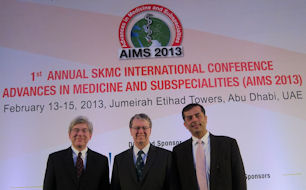
From left: Jim Ott, SVP, ACP International Programs; Dr. David Bronson, ACP President; Dr. Adeel Butt, Chair of Medicine, SKMC.
Internal Medicine: Global Perspectives
Rodolfo Bado, MD
President, International Society of Internal Medicine
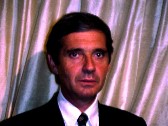 The International Society of Internal Medicine (ISIM) was founded in 1948 in Basle, Switzerland. Its purpose is to promote scientific knowledge and unity in Internal Medicine, to further the education of young internists and to encourage friendship between physicians in all countries.
The International Society of Internal Medicine (ISIM) was founded in 1948 in Basle, Switzerland. Its purpose is to promote scientific knowledge and unity in Internal Medicine, to further the education of young internists and to encourage friendship between physicians in all countries.
Membership to ISIM is of two types: Society Membership, and Honorary Membership. Today, ISIM comprises the national societies of Internal Medicine of over 60 different countries throughout the world as Society Members.
What inspired you to become a physician?
Since I can recall, I knew I was going to study medicine. The closest point of reference was my father, Professor at the Dentistry School. After seven years in elementary, and five years in college, I started the School of Medicine for six years. During that time, I never doubted my vocation. After 35 years in practice and teaching, I still feel the same way.
What do you enjoy about being an internist?
Internal diseases are those originated within the human body, affecting people since the beginning of times, and they were not evident as external injuries which were caused by trauma. So, the need to interpret the patient's signs and symptoms to make a diagnosis is one of the most challenging features of internal medicine. We call the internists "medico de cabecera"; this can be translated as the doctor who is at the bedside of the patient, and that is what it means to be an internist. We can cure few times, alleviate sometimes, but we always care for the patients.
Can you describe the role of the ISIM? What are the missions and goals of the organization?
The International Society of Internal Medicine was founded in 1948, in the post World War II period, with the aim to universalize medical knowledge, enhance the education of young internists and promote friendship between physicians all over the world. ISIM still pursues these goals particularly in less fortunate countries, facilitating access to top level lecturers through biannual international congresses and courses which are held in all continents.
The participation of national, regional and international internists is a rich mixture to obtain a universal view of the achievements and problems of practicing medicine in different parts of the world.
What motivated you to become involved in the ISIM and to take on the role of President?
I joined the Buenos Aires Society of Internal Medicine (SMIBA) to obtain my specialization in Internal Medicine at the time I became a physician, and since then I have actively participated in the society's activities. SMIBA held the ISIM 8th Congress of Internal Medicine in 1964, and in 2002 we bid to host the 29th ISIM Congress that took place in 2008.
In 2006, I became a member of the ISIM Executive Committee. The inside view of this productive international society was amazing, from the friendship of my international peers to the activities providing world-class educational opportunities for thousands of internists in different countries like Indonesia, Taiwan, Spain, Argentina, Russia, Chile and Australia. I have participated as a speaker in Latin America, Europe and Asia and I have been nourished learning about internal medicine practice. After six years as member of the Executive Committee, I was elected as President for 2012-2014. It is an honor to continue to enhance the goals of ISIM.
What would you like to accomplish as ISIM President?
ISIM gathers 61 national societies of internal medicine, each one with its own idiosyncrasies, mainly from Latin America, Europe and Asia. We are also starting relationships with China and a few countries in Africa. Some countries are more active than others, and I will try to incentivize the international participation in our congresses and courses. Our next few congresses will take place in Korea in 2014, Indonesia in 2016, and South Africa in 2018. It will be a challenge to increase the number of international attendees and the quality and diversity of speakers.
What have you found to be the most rewarding part of leadership? The most challenging?
As members of the ISIM Executive Committee, we maintain virtual contact because we live and practice in nine different countries. Friendship and camaraderie are the most rewarding prizes we have received by working together. We share the same aims as stated in the ISIM statutes. The most challenging part is to work out the possibilities of ISIM.
Describe any collaboration that the ISIM is undertaking with ACP or with other medical societies?
The relationship of ISIM with the American College of Physicians has been a fundamental step in the way ISIM has developed. The endorsement of ACP given to ISIM's activities continue to grow. In the near future, a joint congress between ACP and ISIM will enhance the possibilities for internists to access high quality educational opportunities worldwide.
ISIM has also been working with the Latin American Society of Internal Medicine (SOLAMI) by participating in 2011-2012 in national and regional meetings and providing speakers for congresses in Guatemala, Dominican Republic, Venezuela, Colombia, Mexico and Argentina. Our relationship with the European Federation of Internal Medicine (EFIM) is another promising area of collaboration to explore.
Update Your Knowledge with MKSAP 16 Q & A
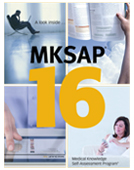
The new Medical Knowledge Self-Assessment Program® (MKSAP® 16) provides you with the most current and critical information in the core of internal medicine and its subspecialties so you can stay aware of what you need to know as a practicing physician in internal medicine today.
For more information on MKSAP 16, or to order your copy, visit http://www.acponline.org/products_services/mksap/16/
MKSAP 16 Q & A
A 58-year-old man is evaluated for an 8-month history of slowly progressive right shoulder pain. The pain is located over the anterior shoulder and is worse with moving his arm across his chest and also when he fully abducts his arm. His only medication is acetaminophen.
On physical examination, vital signs are normal. He has pain when he forward elevates his right arm to 90 degrees and actively adducts his arm across his chest wall (positive cross-arm test). There is pain with shoulder abduction beyond 120 degrees. He exhibits normal shoulder internal and external range of motion. There is pain with palpation of the acromioclavicular joint. He has no pain with his left arm in full flexion (negative Neer test). He is able to slowly lower his right arm to his waist (negative drop-arm test).
Which of the following is the most likely diagnosis?
A. Acromioclavicular joint degeneration
B. Adhesive capsulitis
C. Rotator cuff tear
D. Rotator cuff tendinitis
Click here for the answer and critique.
International Meetings Update
ACP Central America Chapter Meeting
January 25-26, 2013
The ACP Central America Chapter Meeting was held January 25-26, 2013 in Panama City, Panama. There were around 500 attendees at the meeting, including around one hundred residents and students. Five different Central American countries were represented with a mix of both academic and private institutions throughout.
David Fleming, MD, FACP, served as the ACP International Ambassador to this meeting. He was invited to serve by Dr. Aron Benzadon-Cohen, MD, FACP, Governor, Central America Chapter. Dr. Fleming spoke on "Ethical Aspects at the End of Life" and also gave an ACP update presentation. Other invited speakers from the United States included William Davis, MD, FACP and Marc Kahn, MD, MBA, FACP. There was an ACP exhibit booth at the meeting.
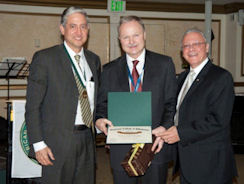
From left: Dr. Mendez, Dr. Fleming, and Dr. Benzadon.
The Central America Chapter was presented with the 2012 Chapter Excellence Award during this meeting. The Chapter bestowed a Laureate Award to Jose Mendez, MD, FACP, Immediate Past Governor, ACP Central America Chapter and Federico Guillermo Alfaro Arellano, MD, FACP.
APICON 2013
January 31 - February 3, 2013
The annual meeting of the Associations of Physicians of India (APICON) was held from January 31 to February 3, 2013 in Coimbatore, India. There were around 5,000 attendees at the meeting. Kesavan Kutty, MD, MACP served as the ACP International Ambassador at the meeting.
Future Worldwide Internal Medicine Meetings
Upcoming meetings will be held in Australia, Poland, and the Philippines.
A complete list of other Future Worldwide Internal Medicine Meetings is available here.
New International Fellows
ACP is pleased to announce the following newly elected International Fellows, who were recommended by the Credentials Committee and approved for election by the Board of Regents as of March 1, 2013. They are listed by current location and may have been credentialed through a different Chapter.
Australia
-
Sergio Diaz Alvarez, MBBCh - Boambee NSW
Canada
-
Edwards D. Ndovi, MBChB, FACP - Bonnyville, AB
- Gregg M. Eschun, MD, FACP - Winnipeg, MBSK
- Adel G. N. Ghali, MBChB, FACP - Dollard-Des-Ormeaux, QC
- Merlyn E. Mshiu, MD, FACP - Brandon, MBSK
- Lee S. Roth, MD, FACP - Toronto, ON
-
Shahzad Zia, MBBS, FACP - Edmonton, AB
Bahrain
-
Sameer M. Alarrayed, MBChB, FACP - Hamad Town Northern
-
Khalid Bin Thani, MD, FACP - Muharraq
Barbados
-
Ambrose P. Ramsay, MBBS, FACP - St. Peter
Brazil
-
Ivan Aprahamian, MD, FACP - Sao Paulo
Central America
-
Diogenes A. Giraldo Romero, MD, FACP - Panama
-
Euriko Gaspar Torrazza R., MD, FACP - Panama
Colombia
-
Jaime Toro Gomez, MD, FACP - Bogota
Dominican Republic
-
Claudia Arias, MD, FACP - Santo Domingo
England
-
Prof. Andrew J. M. Boulton, MD, FACP - Manchester
Iraq
-
Akram M. Al-Mahdawi, MD, FACP - Baghdad
Japan
-
Noriko Kawashima, MD, FACP - Fujisawa
India
-
Sona S. Abraham, MBBS, FACP - New Delhi
-
Shariq R. Masoodi, MBBS, FACP - Srinagar, Jammu & Kashmir
Indonesia
-
Sally A. Nasution, MD, FACP - Bekasi, West Java
Mexico
-
Isaac Raffoul-Cohen, MD, FACP - Huixquilucan
Pakistan
-
Faisal W. Ismail, MBBS, FACP - Karachi
- Tanvir U. Salam, MBBS, FACP - Lahore
-
Javed Sarwar, MBBS, FACP - Abbottabad
Paraguay
-
Maria Cristina Jimenez, MD, FACP - Asuncion
Peru
-
Rolando Vasquez Alva, MD, FACP - Lima/p>
Philippines
-
Oscar T. Cabahug, MD, FACP - Makati City
- Ma Lourdes O. Daez, MD, FACP - Quezon City, Metro Manila
- Mariano B. Lopez, MD, FACP - Cainta Rizal
-
Mario M. Panaligan, MD, FACP - Quezon City
Saudi Arabia
-
Abdulaziz Husain Al-Faifi, MD, FACP - Taif
-
Faraz A. Niax, MD, FACP - Riyadh
Taiwan
-
Ding-Cheng Chan, MD, PhD, FACP - Taipei
Thailand
-
Pannida Wattanapanom, MD, FACP - Muang Nonthaburi
United Arab Emirates
-
Syed R. Ali, MD, FACP - Al-Fujairah
-
Aref Ahmad Chehal, MBChB, FACP - Abu Dhabi
Highlights from ACP Internist and
ACP Hospitalist
ACP Internist February 2013
- ACP launches operations in India
The American College of Physicians begins educational programs in India, consisting of guest lectures, training workshops and conferences.
- Searching for signs of eating disorders
Internists are often the first clinicians to see signs of an eating disorder, with the rapid or extreme changes in weight apparent both in person and from the history recorded in a patient's chart. But primary care clinicians may sometimes be afraid to ask about it because they are unsure how to handle what they might learn.
- Internists play primary role in detecting skin cancer
While it isn't recommended that primary care physicians perform whole-body skin exams for skin cancer, they can and should be alert for skin lesions with malignant features. An easy acronym and other tips and tricks can make the difference.
- Don't give up on patient self-management
Time-pressed physicians are adopting a team approach as they grapple with how to help their patients improve their health. Referred to as "patient self-management," the sometimes time-consuming process can be handled directly or through trained coaches.
ACP Hospitalist February 2013
- Too many or too few: Who belongs in the ICU?
Some experts are starting to question how the nation's critical care beds are being used.
- Grooming residents to be hospitalist leaders
Residents who want to become tomorrow's hospitalists need to learn more than clinical skills to succeed.
- Caring for cancer patients
Knowledge about the effects of cancer treatments on organ systems and the potential risks of surgery unique to cancer patients is becoming key.
- The Brief Case: Cases from Montefiore Medical Center
Amyloid as a cause of refractory heart failure, high-output heart failure from severe anemia, and other cases are discussed.
College Corner
Join ACP's Special Interest Groups!
This newly expanded forum provides ACP members with a place to engage in discussions, share ideas, and support one another professionally and personally. Participate by joining as many groups as you'd like, then connect with ACP members from all over the world with similar interests. Groups include Working Abroad, Women in Medicine, Emerging Technology, Clinical Problem-Solving, and many more. Join today!
MKSAP 16 Answer & Critique
Answer: A, Acromioclavicular joint degeneration
Educational Objective: Diagnosis acromioclavicular joint degeneration.
Key Point: Acromioclavicular joint degeneration is characterized by pain to palpation of the acromioclavicular joint and pain that occurs with shoulder adduction and abduction above 120 degrees.
This patient's pain is originating from his acromioclavicular joint. Given his age, his pain is most likely due to osteoarthritis. Acromioclavicular joint degeneration typically results from trauma (in younger patients) or osteoarthritis (in older patients). Bilateral involvement should raise concern for rheumatoid arthritis. On examination, there is typically pain to palpation of the acromioclavicular joint. Pain on palpation is a very sensitive but not specific sign of acromioclavicular joint disease; absent pain on palpation makes acromioclavicular joint disease unlikely. Palpable osteophytes may be present. Pain characteristically occurs with shoulder adduction and abduction above 120 degrees.
Adhesive capsulitis is caused by thickening of the capsule surrounding the glenohumeral joint. Pain is characteristically slow in onset and is located near the insertion of the deltoid muscle, and patients often avoid lying on the affected side. On examination, there is loss of both active and passive range of motion. Although this patient's symptoms have been insidious in onset, which could be consistent with adhesive capsulitis, he does not have limited range of motion in all or most planes of motion, which argues against adhesive capsulitis.
Examination findings of a rotator cuff tear include supraspinatus weakness, weakness with external rotation, evidence of impingement, and a positive drop-arm test (inability to slowly and steadily lower the arm completely; the arm drops to the side). The patient has a negative drop-arm sign, which argues against rotator cuff tear.
The patient does not have pain between 60 to 120 degrees of abduction, has normal internal/external rotation, and has a negative Neer and Hawkins sign, all of which argue against the diagnosis of rotator cuff tendinitis.
Bibliography:
House J, Mooradian A. Evaluation and management of shoulder pain in primary care clinics. South Med J. 2010;103(11):1129-1135. PMID: 20890250

